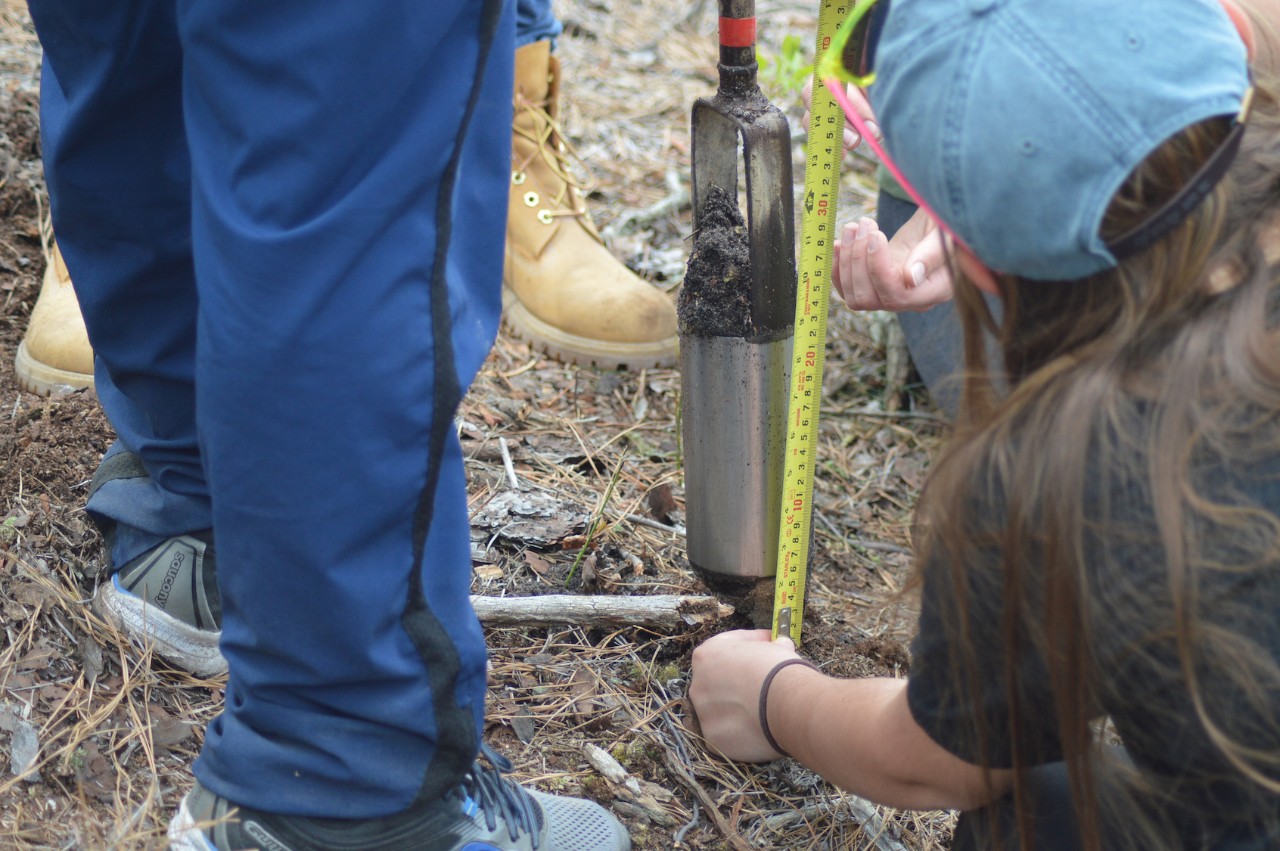
MAJOR FINDER
Filter by College
Filter by Program Types
Filter by Subject
Earth Sciences

Discover our world!
By studying the earth sciences, you will study the planet, the processes that change our landscapes, the history of life and the interactions between environment and society. You will gain the practical and in-demand skills to collect scientific data, inform policy decisions and study the environmental impacts of things like fracking, oil and natural gas extraction, renewable resources, climate change, and more. Earth science graduates are in high demand with starting salaries ranging from $50,000 to $100,000 annually.
AREAS OF STUDY
- Earth History and Paleontology
- Hydrogeology and Environmental Geology
- Coastal, River, and Glacial Processes
- Earth Materials and Geochemistry
- Plate Tectonics
- Climate Change
CAREER OPTIONS
- Geoscientist
- Hydrogeologist
- Environmental Consultant
- Exploration Geologist
- Science Educator
- Paleontologist
- Disaster Scientist
GRADUATE PROGRAMS
- Geoscience
- Oceanography
- Geophysics
- Environmental Science
- Soil Science
- Science Education
- Environmental Law
What’s special about this program?
Earth science students will learn about the Earth in small classes, in labs, and numerous field trips, with faculty interaction and a well-developed sense of community. You are encouraged to participate in research with faculty in areas such as hydrogeology, geobiology, water science, geochemistry, and paleoclimate. You will also have many opportunities for field courses in places of geologic significance. Recent trips have been to Death Valley and the Grand Canyon! You may also be able to benefit from the Delaware Geological Survey, a science-based state agency based at UD that conducts geologic and hydrologic research, service and exploration.
Get Involved
There are many opportunities on campus for students interested in the environment, such as serving as an EnvironMentor, going on extracurricular environmental field trips, and joining registered student organizations like Students for the Environment and the Geology Club.
Sample curriculum
Courses are recommendations, but subject to change year-to year. Please refer to the UD Undergraduate Catalog for a more accurate four year plan. Students should also reach out to their academic advisor for recommendations.
Earth Sciences (BA)
FALL |
SPRING |
|
|---|---|---|
ENGL 110 - First-Year Writing |
CHEM 103 - General Chemistry and CHEM 133 - General Chemistry Laboratory |
|
GEOL 107 - Geology of Dynamic Earth |
GEOL 110 - Earth’s Evolving Systems |
|
Mathematics Requirement* |
Foreign Language Requirement (1/2) |
|
Breadth Requirement (1/9) |
Breadth Requirement (2/9) |
|
First Year Seminar |
||
Credits: 14-15 |
Credits: 15 |
*See program page for approved courses
FALL |
SPRING |
|
|---|---|---|
BISC 207 - Introductory Biology I |
GEOL 203 - Earth Surface Processes |
|
GEOL 202 - Introduction to Earth Materials |
GEOL 302 - Igneous and Metamorphic Petrology |
|
Foreign Language Requirement (2/2) |
Breadth Requirement (4/9) (should satisfy Multicultural Requirement) |
|
Breadth Requirement (3/9) |
Breadth Requirement (5/9) |
|
Spring Break Field Course* |
||
Credits: 15 |
Credits: 15 |
*See program page for approved courses
FALL |
SPRING |
|---|---|
GEOL 304 - Sedimentology and Stratigraphy |
GEOL 305 - Structural Geology and Plate Tectonics |
PHYS 201 - Introductory Physics I and PHYS 221 - Introductory Physics Laboratory I |
GEOL 306 - Geoscience Field Methods (Capstone and DLE) |
Breadth Requirement (6/9) |
Breadth Requirement (9/9) |
Breadth Requirement (7/9) |
Free Elective (1/10) |
Breadth Requirement (8/9) |
Free Elective (2/10) |
Credits: 17 |
Credits: 17 |
*See program page for approved courses
FALL |
SPRING |
|---|---|
Second Semester Science* |
GEOL 307 - The Earth’s History I: Paleobiology or 400-level Elective (GEOL 401 recommended (satisfies Second Writing Requirement) |
Free Elective (3/10) |
Free Elective (7/10) |
Free Elective (4/10) |
Free Elective (8/10) |
Free Elective (5/10) |
Free Elective (9/10) |
Free Elective (6/10) |
Free Elective (10/10) |
Credits: 16 |
Credits: 15 |
*See program page for approved courses
Earth Sciences (BS)
FALL |
SPRING |
|---|---|
CHEM 103 - General Chemistry and CHEM 133 - General Chemistry Laboratory |
ENGL 110 - First-Year Writing |
GEOL 107 - Geology of Dynamic Earth |
GEOL 110 - Earth’s Evolving Systems |
MATH 117 - Pre-Calculus for Scientists and Engineers (if placed) |
MATH 241 - Analytic Geometry and Calculus A |
Breadth Requirement (1/6) |
PHYS 201 - Introductory Physics I and PHYS 221 - Introductory Physics Laboratory I |
First Year Seminar |
|
Credits: 16 |
Credits: 15 |
*See program page for approved courses
FALL |
SPRING |
|
|---|---|---|
BISC 207 - Introductory Biology I |
GEOL 203 - Earth Surface Processes |
|
GEOL 202 - Introduction to Earth Materials |
GEOL 302 - Igneous and Metamorphic Petrology |
|
MATH 242 - Analytic Geometry and Calculus B |
Breadth Requirement (3/6) (should satisfy Multicultural Requirement) |
|
Breadth Requirement (2/6) |
Foreign Language Requirement (1/2) |
|
Spring Break Field Course* |
||
Credits: 15 |
Credits: 16 |
*See program page for approved courses
FALL |
SPRING |
|---|---|
GEOL 304 - Sedimentology and Stratigraphy |
GEOL 305 - Structural Geology and Plate Tectonics |
GEOL 400-level Elective (1/4) |
GEOL 306 - Geoscience Field Methods (Capstone and DLE) |
Second Semester Science* |
GEOL 400-level Elective (2/4) |
Foreign Language Requirement (1/2) |
Quantitative Course (1/2)* |
Free Elective (1/6) |
Breadth Requirement (4/6) |
Credits: 15 |
Credits: 17 |
*See program page for approved courses
FALL |
SPRING |
|---|---|
GEOL 400-level Elective (3/4) |
GEOL 400-level Elective (GEOL 401 recommended (satisfies Second Writing Requirement)) (4/4) |
Quantitative Course (2/2)* |
Breadth Requirement (6/6) |
Breadth Requirement (5/6) |
Free Elective (4/6) |
Free Elective (2/6) |
Free Elective (5/6) |
Free Elective (3/6) |
Free Elective (6/6) |
Credits: 15 |
Credits: 15 |
*See program page for approved courses

